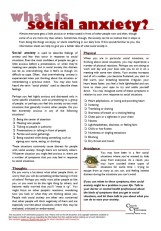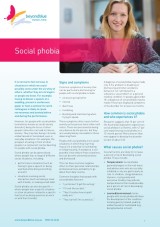There are things you can do to care for yourself and reduce the effect anxiety has on your life.
Learn about social anxiety
Start with the brochures, self-help books, videos, apps, or online courses listed on this page. These can help you understand how anxiety develops, realise that you’re not alone, and learn techniques that other people have used to recover from or manage their social anxiety better. Having knowledge about social anxiety will help you take charge of your fear, rather than your fear being in charge of you.
Learn a controlled breathing or relaxation technique
Learning how to breathe deeply can reduce anxiety and feelings of panic when you encounter situations that trigger your social anxiety. Find out more about managing panic.
Learning how to do progressive muscle relaxation(external link) can help you with general relaxation, as well as relaxing before entering a social situation.
You may find it useful to look at some breathing apps.
Try a self-help programme
It can be really helpful to try a self-help programme. The following are recommended:
Get help if you need it
Although there's a lot you can do to support yourself, it’s also okay to ask for help. Talking therapy (eg, with a counsellor or psychologist) can help a lot, and you can also get medication to help if it's needed.
Find a counsellor or therapist(external link). It can be helpful to ask if they're trained in cognitive behaviour therapy (CBT) as this is currently the treatment of choice for social anxiety. You can talk to your healthcare provider about whether medication would help you.
Join a support group
Joining a support group in your area is a good way to meet others who understand what you’re experiencing and who can share their ideas for managing social phobia. Ask your healthcare provider, or phone Healthline 0800 611 116 or Anxiety NZ 0800 ANXIETY (0800 269 4389), to see if there’s a group in your area. If you can’t go out to an in-person group, check out the online forums and find one that works for you.
Stretch yourself
If you feel you can confront your social anxiety, the best strategy is to tackle social situations in small doses as often as possible. You can try breaking up a stressful situation into smaller, more manageable parts. Practise tackling each part separately before facing the situation as a whole when you feel more comfortable. It’s very empowering to learn that you can feel the feel the fear and do it anyway!
If you’ve recovered from a social phobia, it’s a good idea to keep practicing being in a situation that you used to fear. For example, if you know you’re quite anxious about meeting new people, don’t avoid doing this. If you take every opportunity to meet new people, your confidence will grow.
Stay connected to others
Tell your whānau and friends what you're experiencing. Help them to understand that telling you to just relax or ignore your fears won’t help. Tell them that what you need instead is their support and encouragement while you come to understand and face your anxiety, one small step at a time. They can also help by going to social situations with you so you don’t need to manage on your own.
Stay engaged with your life
It's likely that your social anxiety doesn’t affect every aspect of your life, so make sure you keep up your activities and interests that aren’t affected by it. This improves your quality of life and can help you gain confidence to deal with your social phobia.
Avoid alcohol and other drugs
Alcohol and other drugs aren't recommended for managing your social anxiety. You'll probably feel more anxious after using them which will make your anxiety worse. Read more about alcohol and mental health.
Be physically active
We now know that exercise benefits your mind as well as your body. In particular, it's been shown that regular exercise can help you to manage anxiety, include panic disorder and social anxiety. Find out more about physical activity and mental health and the general benefits of being active.
Spend time in nature
Nature is key to unlocking your wellbeing. Researchers have found that spending time in nature improves your physical and mental wellbeing. Find out some ideas for ideas for spending time in nature.
Eat a healthy diet
Eating to ensure you have good nutrition will give you the sustained energy to help you manage your anxiety. Learn more about healthy eating basics.
Find a greater purpose
Connecting with something that has greater meaning can be a useful support when you're managing any mental health issue, including a social anxiety. This could be through:
- religion or spirituality
- connecting with your culture or whakapapa
- a creative project
- volunteering or helping others in need.
This can distract you from your own problems for a while and build resilience to manage your anxiety symptoms when they affect you.








